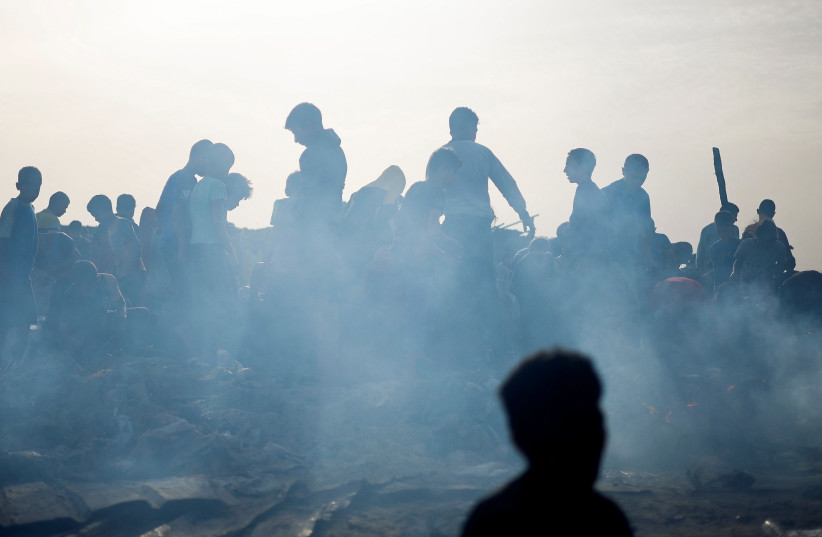Algeria proposed a draft United Nations Security Council (UNSC) resolution that demands a ceasefire in the Gaza Strip, the release of all hostages held by Hamas, and orders Israel to “immediately halt its military offensive” in Rafah.
Algeria’s UN Ambassador Amar Bendjama discussed with the UNSC on Tuesday and Wednesday his intent to move forward with what would be a fourth UNSC resolution on the Gaza war – which began after the October 7 Hamas attack on Israel killed over 1,200 people and seized 252 hostage, of which 125 remain in captivity in the enclave.
The Algerian draft text, seen by Reuters and posted on social media, uses the strongest Security Council language to date, declaring that “Israel, the occupying power, shall immediately halt its military offensive, and any other action in Rafah.”
Push for Gaza resolution
Diplomats said the council could vote within days, following a closed-door session on Tuesday and the subsequent monthly open session held Wednesday on the Israeli-Palestinian conflict.
The push for a UNSC resolution on Gaza after an attack on Sunday set off a blaze in a designated humanitarian-zone camp in Rafah, killing at least 45 people.

The IDF said that its “targeted strike in Rafah, 1.7 km. from the humanitarian area, used precise munitions carrying 34 kg. of explosives to eliminate two senior Hamas terrorists.”
Israel is exploring the possibility that shrapnel from the strike set off a “secondary explosion from a Hamas munitions warehouse near the civilian compound and over 100 m. away from the strike site,” causing the fire that claimed 45 lives.
To pass, a council resolution needs at least nine votes in favor and no vetoes by the United States, United Kingdom, France, Russia, or China. The US has so far shielded its ally, Israel, by vetoing three draft council resolutions on the war in Gaza.
But Washington has also abstained on three votes, most recently allowing the council, in March, to demand an immediate ceasefire between Israel and the Hamas terrorist organization.
France’s Ambassador to the UN Nicolas de Rivière said that his country was also promoting a resolution on the Gaza war. “There must be an immediate ceasefire in Gaza and an unconditional release of the hostages. There is no safe zone for Palestinians in Rafah,” de Rivière said.
He called on Israel to halt its military activity in Gaza and for Hamas to stop its rocket attacks against Israel. Israel must also allow an increase in humanitarian assistance in Gaza, he said.
De Rivière said that the UNSC “cannot just talk, it needs to act.”
The French resolution is expected to address all aspects of the conflict, including the “day after” plan and a long-term political solution.
Both France and Algeria have strengthened their calls for an end to Israel’s military campaign in Gaza, referring to the International Court of Justice (ICJ) ruling, Friday, that Israel must halt any military activity that destroys the Palestinian group in whole or in part.
The vaguely-worded ruling has been interpreted by many countries as a demand that Israel end its military activity in Rafah to destroy Hamas. Israel has understood it as a prohibition against destroying the Palestinian people and has stressed that the IDF can continue to operate, since its military operation in Gaza is against Hamas.
Israel’s Foreign Ministry has messaged its envoys in countries with seats on the UNSC about the importance of blocking the resolution.
Hamas has said that more than 36,000 Palestinians have been killed, of which it has verified close to 25,000 deaths. Israel has said that 14,000 of the fatalities in Gaza are Hamas terrorists.
The push for a UNSC resolution comes as Spain, Ireland, and Norway have become the first three European countries to unilaterally recognize a Palestinian state.
French President Emmanuel Macron said on Tuesday, “There are no taboos for France, and I am totally ready to recognize a Palestinian State.”
“But,” he said, “I think this recognition must happen at a useful moment, as part of a process to which Israel and other states in the region would commit; a process which would lead, along with reforms from the Palestinian Authority, to useful results.
“I will not do an emotion-based recognition,” Macron said.
